You are here
New Releases
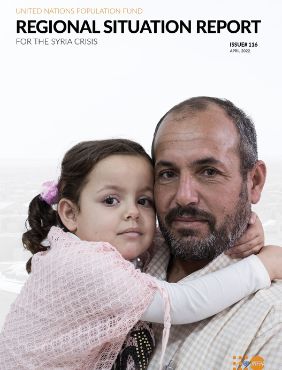
Regional Situation Report for the Syria Crisis (April)
As of April 2022, Syrians and host communities throughout the region continue to face the escalating impact of a protracted humanitarian crisis, further complicated by a deteriorating economy, continuing hostilities, and an unrelenting pandemic. The crisis region, which spans the Whole of Syria, Turkey, Lebanon, Jordan, Iraq, and Egypt, continues to face a multitude of challenges, particularly in light of the recurrent waves of COVID-19 infections that continue to exacerbate existing needs. A decade into this protracted crisis, people in need continue to endure the cumulative effects of years of instability, the risks of which are even higher now due to the impacts of a far-reaching economic meltdown. The Regional Situation Report for the Syria Crisis offers a bird’s eye view of UNFPA’s operations within the context of the Syria crisis. The report is prepared by the UNFPA Regional Humanitarian Hub for Syria and the Arab States in Amman, Jordan, and spans operations conducted by UNFPA offices in Turkey, Lebanon, Jordan, Iraq, and Egypt, in addition to operations conducted inside Syria from Damascus and cross-border via Turkey
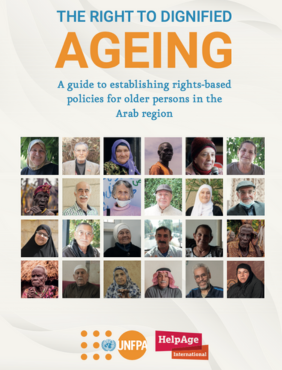
The Right to Dignified Ageing - A guide to establishing rights-based policies for older persons in the Arab Region
The Right to Dignified Ageing a guide to establishing rights-based policies for older people in the Arab region is the result of a partnership between UNFPA Arab States Regional Office and HelpAge International to make older persons rights visible in laws, policies, strategies, measures, research and data.
The Guide aims to better align national ageing strategies and policies with a comprehensive human rights approach. It also provides a practical tool for policy makers to formulate new, and revise existing, strategies on ageing, to better align them with the human rights standards formulated in the APA Resolution on Ageism, Madrid International Plan of Action on Ageing and Arab Regional Ageing Strategy 2019 – 2029 initiatives.
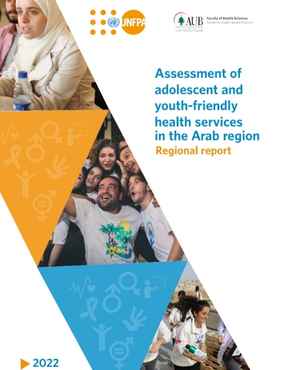
Assessment of adolescent and youth-friendly health services in the Arab region
UNFPA Arab States Regional Office in partnership with the Center for Public Health Practice (CPHP) and the Faculty of Health Sciences (FHS) at American University of Beirut (AUB),conducted an assessment of adolescent and youth-friendly health services (AYFHS).
This assessment was conducted in 16 countries in the Arab region, including Algeria, Djibouti, Egypt, Iraq, Jordan, Lebanon, Libya, Morocco, Sultanate of Oman, Palestine, Somalia, Sudan, Syria, Tunisia, the United Arab Emirates and Yemen.
The overall objective of this regional review is to support UNFPA Arab States Regional Office and country offices in understanding the situation of AYFHS in the Arab region in comparison to the global standards for quality health care services for adolescents and youth Friendly Health Services, as well as to inform initiatives for strengthening these services for further support of the planning, development and implementation of interventions.
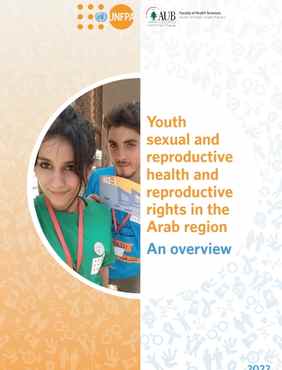
Youth sexual and reproductive health and reproductive rights in the Arab region overview
UNFPA ASRO in partnership with the American University of Beirut (AUB) conducted an overview of youth sexual and reproductive health and reproductive rights (SRHRR) in the Arab Region. This overview aims at providing policymakers, civil societies and development practitioners in the Arab countries with a knowledge tool to advance the implementation of the Programme of Action of the International Conference on Population and Development (ICPD) as well as to ensure that issues pertaining to youth’s needs are equitably addressed in this process.
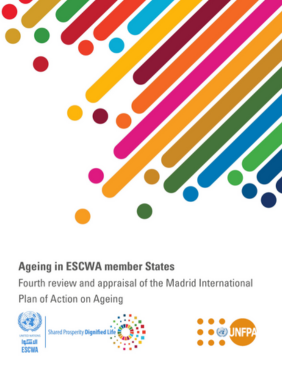
Ageing in ESCWA member States - Fourth review and appraisal of the Madrid International Plan of Action on Ageing
The fourth review report on the Madrid International Plan of Action on Ageing is the result of a joint partnership between UNFPA Arab States and ESCWA. The report is developed based on a consultation with Arab countries to assess current situation and challenges of older persons in the region, on a series of regional virtual dialogue meetings involving multiple actors, including civil society organizations, academics and representatives of Arab parliaments and a regional meeting organized in ESCWA premises that brought together all governmental and non-governmental stakeholders.
The report provides a summary of the most prominent findings from the national review reports submitted by Arab States, describes progress, achievements and challenges in economic support, social development and the health and well-being of older persons and sets out recommendations to accelerate implementation of the aging agenda in the region.
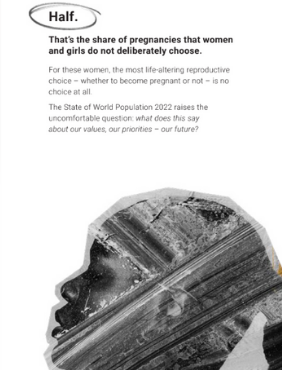
SWOP 2020 Highlights Brochure
An estimated 121 million pregnancies per year take place in the bodies of women who did not choose pregnancy or motherhood, who were not planning to have a child at that time, with that partner, in those circumstances. This is an unseen crisis, invisible in part because it is so common – nearly everyone knows someone who has experienced an unintended pregnancy – and in part because it is widely stigmatized.
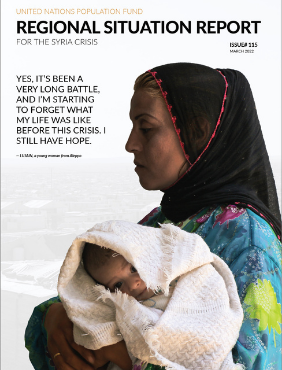
Regional Syria Crisis SitRep - March
As of March 2022, the situation in Syria continues to be dire, further complicated by a deteriorating economy, increasing hostilities, and an unrelenting pandemic. The crisis region, which spans the Whole of Syria, Turkey, Lebanon, Jordan, Iraq, and Egypt, continues to face a multitude of challenges, particularly in light of the recurrent waves of COVID-19 infections that continue to exacerbate existing needs. A decade into this protracted crisis, people in need continue to endure the cumulative effects of years of instability, the risks of which
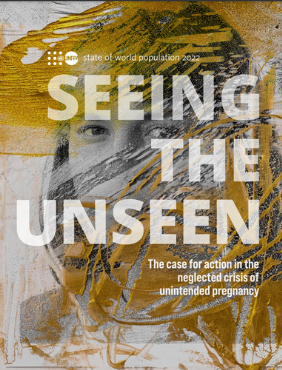
Seeing the Unseen
A world where every pregnancy is wanted. This aim is a central pillar of our mission at UNFPA. Every human being has the right to bodily autonomy, and perhaps nothing is more fundamental to the exercise of that right than the ability to choose whether, when and with whom to become pregnant.
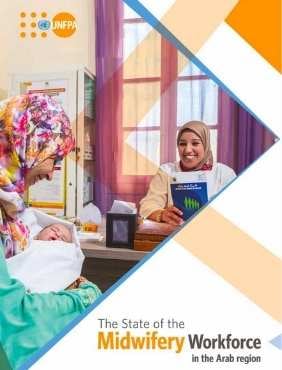
The State of the Midwifery Workforce in the Arab Region
This report provides an up-to-date evidence base to highlight progress since the last regional midwifery workforce report in 2015 and to project forward to 2030. It includes data from 20 countries that are covered by the UNFPA Arab States Regional Office: Algeria, Bahrain, Djibouti, Egypt, Iraq, Jordan, Kuwait, Lebanon, Libya, Morocco, Oman, Palestine, Qatar, Saudi Arabia, Somalia, Sudan, Syria, Tunisia, United Arab Emirates, and Yemen. It is primarily intended to support policy dialogue at national and regional levels, to assist countries in the region to meet the challenges of the health-related SDGs and the universal health coverage (UHC) agenda. Understanding the current state of the midwifery workforce is necessary to allow individual countries in the region to identify specific challenges, gaps and bottlenecks, and to look for appropriate strategies to overcome them.
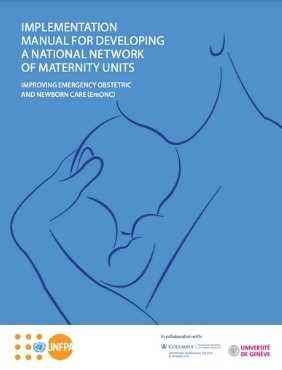
Implementation Manual for Developing a National Network of Maternity Units
Maternal mortality is decreasing globally, but not fast enough and with critical inequalities across the regions of the world. Dying while giving birth is not only an unacceptable human right violation but also a violence against women in times where the majority of the maternal deaths are preventable if appropriate healthcare is provided.